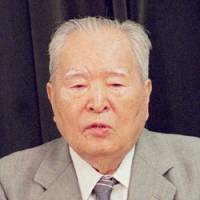Kenji Miyamoto, who in the 1930s was jailed amid a government crackdown on the Japanese Communist Party, then later held leadership positions in the JCP for about 50 years and played the key role in guiding it through the postwar period, died Wednesday at a Tokyo hospital, JCP sources said. He was 98.
As JCP general secretary, Miyamoto formulated a new platform in 1961 rescinding the party's advocacy of revolution by force and shifting to seeking democratic revolution.
The party has since maintained that basic policy.
Miyamoto became general secretary in 1958 and presidium chairman in 1970. Under his strong leadership the party maintained a unique position, distancing itself from the Communist parties of the former Soviet Union and China.
The JCP took a soft line under Miyamoto. At a party convention in 1976, it removed the phrase "proletarian dictatorship" from its platform and adopted a declaration of freedom and democracy.
Tetsuzo Fuwa took over as presidium chairman in 1982, but Miyamoto remained influential within the party. He held the post of chairman until his retirement in September 1997, after which he held an honorary position.
The party is currently led by Kazuo Shii.
Hailing from Yamaguchi Prefecture, Miyamoto graduated from Tokyo Imperial University's economic department and joined the party in 1931. He was arrested by the military police in 1933 over the death of a police spy and spent 12 years in prison until Japan surrendered in 1945.
He served two terms in the Upper House.



